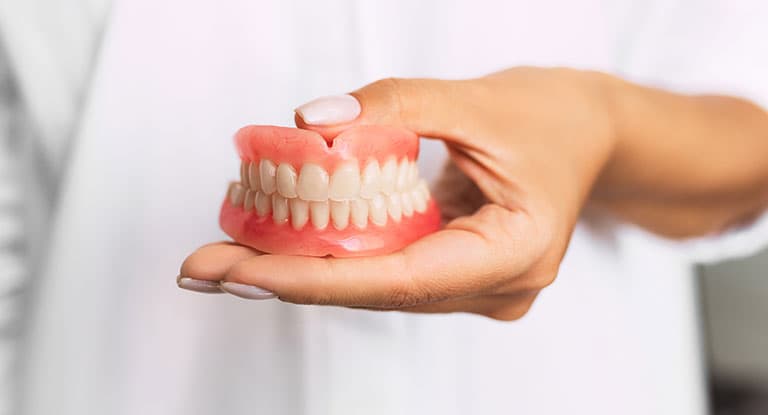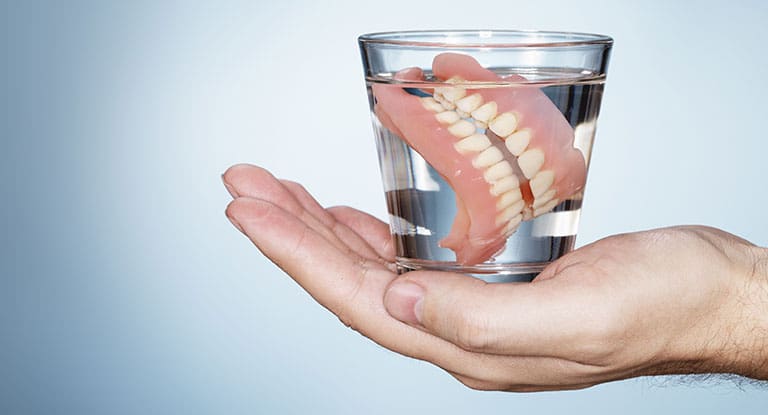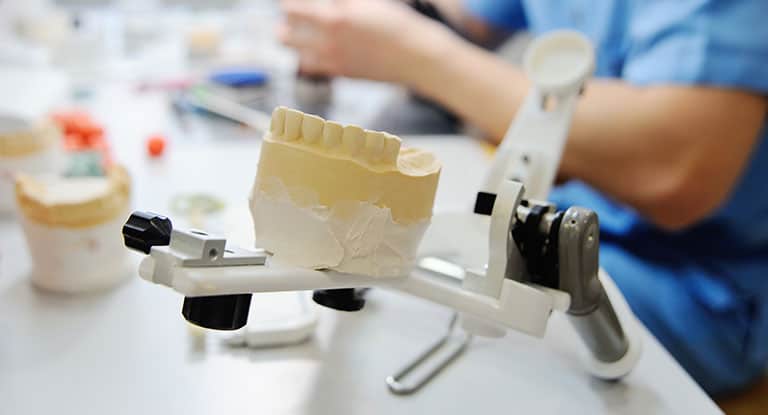

Dentures are detachable materials which are made to be worn by patients in place of their lost teeth. This will enable you to eat comfortably, speak with ease and improve the smile on your face.
Dentures which can either be plastic or metallic are usually of two types which include;
You will find out that it is very difficult to speak whenever you don’t have teeth. Therefore, it is important to get a full denture to provide you with additional comfort when you are eating or speaking. You will also notice that the muscles present in the face will drop because there are no teeth available to support them, so wearing a full denture will prevent such a thing from happening. This will, in turn, help to beautify your facial expression.
Whenever you have empty spaces caused by teeth that must have fallen, it is advisable to get a partial denture to cover this gap so that you don’t have a situation of an irregular dentition or a situation where the whole teeth get badly affected as a result of cracked teeth.

Most times, your dentures can be provided for on the same day that your teeth are being taken out, also called immediate dentures. In this situation, the patient must have made a prior visit to the dentist, to construct an accurate replica of your jaw.
In this particular instance, you are sure not to be without teeth while your jawbones are passing through the restructuring process. But if you are without teeth especially within few months of your teeth removal, your gums and the bones in your jaw will begin to take a different shape, changing a lot as time progresses, thereby causing so many readjustments to your immediate denture.
In some cases, the dentist might advise you to exercise patience for a very long time so that your gums and jawbones can adjust perfectly to fit your new dentures.
To provide you with the best denture that perfectly fits on your gum, you are required to pay a preliminary visit to your dentist to collect details regarding the length and size of your bite or jaw. These details are eventually sent across to the dental technician to provide you with an accurate sample. For further enquiries, contact us today.
Wearing a denture to provide cover for your teeth that have been removed is very important. It is never easy to live comfortably without your teeth. So having a denture will enable you to speak with ease and to eat without any difficulty.
A full denture performs the same function as your original teeth by ensuring that your facial muscles are held in place. Without them, the muscles suddenly drop over time, making you look old and funny.
Most dentures provided recently has been done in such a way that there is little or no difference between them and your original teeth, so you don’t have to worry about any changes in your looks. It goes further to beautify your face.
When eating with your dentures, make sure that you eat foods that don’t contain shells or bones. Eating with your dentures is a gradual process and might require some time. So endeavour to bite your food slowly to prevent the denture from shifting out of position. Continue this process until you return to your regular diet.
Speaking is entirely a gradual process. So it might be of great help if you keep saying some words out loud from time to time, especially the words that are difficult to pronounce. Whenever your dentures shift out of position when shouting or laughing out loud, chew and swallow down slowly to put them back in place. But if this problem persists, make sure you request the services of our highly trained dentist by calling our helpline on 020 71834091, and we will attend to you.
It is usually important to wear your dentures constantly within the initial days after the first insertion. This enables your jaw to get used to the new dentures. After some days or weeks, you might be directed by your dentist to remove your dentures at intervals, especially before you are about to sleep at night, to allow your mouth to stay fresh and warm.
Make sure that when your dentures are not in use, immerse it inside a glass of water to prevent warping.
In most cases, the upper jaw possesses a fine gum structure to hold the upper denture in place, unlike the lower jaw, which lacks an adequate stronghold. This causes the lower denture to feel shaky because it has to stay firmly in the middle of your tongue and cheeks.
But after a while, you’ll get used to your new dentures and how to position it firmly.

Some people feel that it becomes necessary to use a denture glue or fixative to position the denture firmly when it starts to come off instead of changing the dentures entirely. These dentures are being constructed in such a way that it relaxes perfectly on your gum, so it doesn’t require any fixative to hold it in place.
Note that a denture that is loosed can result in severe mouth odour and sores to the mouth. This happens most especially when you have made use of an immediate denture for an extended period.
The same way that you care for your full dentures is the same way that you should also take care of your mouth. Always brush your mouth regularly, at least twice a day. When brushing, make use of a soft brush by scrubbing the roof of your mouth, your gums and your tongue to get rid of any plaques that must have stuck. This ensures that you don’t develop mouth odour or any form of gum infection.
Always endeavour to brush your teeth regularly as well if you have a partial denture, to avoid any form of damage to your remaining teeth. Make sure you get in touch with our Harley Street, London dentist today, if your teeth require further treatment.
Your dentures can serve you for a very long time if you adhere strictly to standard maintenance procedures. Although, there are cases where your dentures might need to be readjusted or reconstructed if it starts to sag in your mouth. This usually happens whenever your dentures become tired, or as a result of sudden changes in the structure of your jaw.
A sagging denture can render severe pains to your mouth, thereby causing various mouth infections, which will make it uncomfortable for you to eat or talk. So, make sure you change your dentures as soon as possible immediately you notice that it no longer fits to prevent any health implications.

It is vital that you go on regular appointments to see your dentist. Having these appointments ensures that your dentist conducts regular examinations to ascertain the current condition of your mouth and teeth. This helps to prevent any unexpected health problems that may arise due to infectious teeth.
It is advisable always to meet a professional who is highly trained in dentistry whenever you experience any form of difficulty in removing any tough stain from your dentures.
There are alternative solutions, such as getting bridges or opting to undergo a dental implant. To get additional information, book an appointment with our dentist for other suitable treatment options.
For further assistance on how to manage your dentures effectively, get in touch with our highly trained professionals.